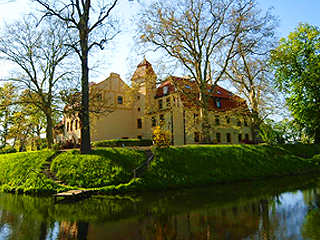Charter
Traslatep
Constitution of the European Meetings Foundation
Kashubian Culture Centre in Krokowa
Chapter I: General statements
§ 1
1. The ‘European Meetings’ Foundation Kashubian Culture Centre in Krokowa, hereinafter referred to as ‘the Foundation’ has been established by means of Legally Binding Agreement drawn up on 12 October 1990, Repetytorium No 175/1990 in the No. 2 Office of the Official Solicitor For the City of Gdynia, between the parties:
1/ Ulrich Reinhold Heinrich Graf von Krockow,
2/ Krokowa commune.
2. The Foundation carries on its activities on the basis of the provisions of the Act dated April 6th, 1984 On Foundations (Official Journal, No.46, year 1991 item 203) as well as the provisions hereof.
3. The Constitution is legally binding.
§ 2
The Headquarters of the Foundation is the park- and –palace complex, Krokowa County, Pomorskie Province, Poland.
§ 3
The Foundation performs its activities on the territory of the Republic of Poland and outside its borders according to the regulations of law. The Foundation may carry out its activities on the basis of its established branches.
§ 4
The Foundation may carry on non-profit business enterprise in order to finance statutory activities by way of its established organisational units, e.g. a hotel, a conference centre (hotel and catering activity and training activity) and others as well as (when it is beneficial), by the agency of capital companies of commercial law, where the Foundation should be a dominant entity.
§ 5
The Foundation may cooperate or be the member of both Polish and foreign organizations or associations with similar objectives and aims.
§ 6
The Foundation’s activity is supervised by the Minister of Culture and Arts.
In case of disagreement between Founders, the mediator is appointed by the Foundation Council.
Chapter II: Objectives, forms and the scope of Foundation’s activities
§ 7
The objective of the Foundation is:
a) the revaluation of the park-and-palace complex in Krokowa,
b) the creation of the Kashubian Culture Centre and Nation’s Meetings in Krokowa on the basis of the park-and-palace complex,
c) the social and economic development of the Northern Kashubian Region and the preservation of tradition and culture of that region,
d) the development of contacts and cooperation between the Republic of Poland and the Federal Republic of Germany, especially between partner communes: Schweich and Krokowa.
§ 8
The Foundation realizes objectives stated in § 7 by the following activities:
a) the organization and funding of courses, seminars, lectures and public lectures,
b) the organization of meetings with writers and artists as well as representatives of youth organizations and ecumenical movement,
c) charity aid for medical healthcare in the Northern Kashubia Region including, among others: the creation of workplaces for the handicapped, especially the inhabitants of Krokowa Commune,
d) funding the museum and research into history and culture of the Northern Kashubia Region,
e) funding the renovation works of the park and palace complex in Krokowa assigned to become the Kashubian Centre of European Meetings,
f) funding the research into natural environment protection in the Northern Kashubia Region, including e.g. financial and organizational support for the Northern Kashubia Region communes at the introduction of the selective solid waste management,
g) funding meetings and visits contributing to the development of cooperation between partner communes: Krokowa and Schweich in order to develop the Northern Kashubia Region.
Chapter III: Organs of the Foundation
§ 9
The organs of the Foundation are:
1/ The Foundation Council,
2/ The Board of Directors.
§ 10
1. The Foundation Council is made up of four members:
a) A representative of the founder – Krokowa commune,
b) A representative of the founder – the Europäische Begegnung Foundation with the seat Föhren k. Trier (Germany),
c) Two representatives of social organizations proposed by the founders.
2. Members of the Foundation Council perform their functions personally or by the authorised agent.
3. Members of the Council cannot sit on the Foundation Board. A founder cannot be a member of the Board.
4. The members of the Council work voluntarily and do not receive any payment; they cannot make any profit related to their function, which would burden the Foundation in any way.
§ 11
The Foundation Council which also functions as The Board of Directors:
a) defines main directions of Foundation’s activity and supervises their appropriate realization,
b) changes the Foundation’s aims and adopts changes in the statute of the Foundation,
c) raises financial and material funds for statutory activity of the Foundation,
d) appoints and recalls the Board of Directors, the Members of the Board and establishes the rules of their employment and salaries,
e) accepts the financial plan of the Foundation’s activity,
f) considers and accepts reports on the Board’s activity,
g) accepts annual reports, balance sheets and activities of the Board, and each Member individually,
h) adopts resolutions on transformation, combination or liquidation of the Foundation and the place of its assets,
i) decides about acquisition and disposal of real estates by the Foundation,
j) awards honourable mentions to people of merit to the Foundation,
k) constantly supervises and controls the Foundation’s activity in all fields of its activity,
l) represents the Foundation in litigations with the Board or its individual members,
§ 12
1. The Foundation’s Chairman convenes a session at least twice a year. Sessions may be convened by two Members of the Foundation Council or by the Board.
2. Works of the Foundation Council are managed by two Deputy Chairmen representing the Founders in two periods, agreed by the Council and a Council’s Secretary appointed from the members of the Council. The Council acts according to the approved Regulation of the Council. The Foundation Council may adopt resolutions in the presence of at least 3 Members of the Council.
3. Resolutions are adopted if at least 3 Members of the Foundation Council vote for them, with the exception of resolutions concerning:
a) changes in the Constitution,
b) liquidation of the Foundation,
where it is necessary for all Members of the Council to vote for.
4. Members of the Board and people invited by the Foundation’s Council may take part in sessions as an advisory body.
§ 13
1. The Board of Directors manages the Foundation’s activities and represents it in its external relations.
2. The Board of Directors is made up of three members including two Deputy Chairmen.
3. Apart from current issues of a common board, where members make decisions individually according to their competences, the Board makes decisions in the form of resolutions.
4. Board’s resolutions are valid, when 2/3 of the members are for adopting those resolutions.
5. Two Members of the Board are needed to prepare declarations of will on behalf of the Foundation and to sign documents.
§ 14
1. The Board of Directors is appointed for an undefined period of time but the Foundation’s Council may recall the Board any time.
2. A Member of the Board may be recalled by the Foundation’s Council when:
a) a Member resigns by letter to the Council,
b) the Member’s annual report and activities are not accepted,
c) he seriously disobeys the regulations of the Statute.
3. Should the Board or its Members be recalled, the Foundation Council chooses a new Board or missing members within 42 days.
§ 15
1. Meetings of the Board are convened by one of Deputy Chairmen when needed but at least once a month.
2. The sessions are presided over by one of the Deputy Chairmen or an authorized Member of the Board.
3. Members of the Board perform their duties voluntarily or receive payment.
4. The employment rules for the Members of Board are described in the resolution of the Foundation Council.
§ 16
The Board is responsible specifically for:
a) current management of the Foundation’s activity in accordance with its objectives and regulations of the Statute,
b) drawing and realizing Foundation’s plans of action resulting from the statutory objectives of the Foundation,
c) managing the Foundation’s assets,
d) performing activities commissioned by the Foundation Council,
e) preparing the annual financial plans and presenting them to the Foundation Council for approval,
f) annual reporting to the Foundation Council and appropriate bodies concerning the activity of the Board,
g) performing other tasks connected with the management of Foundation’s works and not appointed to other bodies of the Foundation in the Statute.
§ 17
When a resolution of the Board is against the objectives and welfare of the Foundation as well as the law and inner regulations of the Foundation, The Council has the right to suspend the execution of a Board’s resolution and to insist upon the appropriate explanation. A resolution of the Council is legally binding for the Board.
§ 18
The Foundation Board of Directors has to present all the documents concerning the Foundation’s activity whenever the Foundation Council insists to do so and to present explanations.
Chapter IV: Assets of the Foundation
§ 19
Assets of the Foundation are the financial resources handed over by the Founders in the declaration of will concerning the establishment of the Foundation.
§ 20
1. Foundations incomes:
1) donations, legacies and grants received both from Poland and from other countries,
2) donations by the Founders,
3) income from assets and property rights,
4) interest on bank Deposits,
5) income from public collections,
6) income from securities.
2. On receipt of a donation or legacy, the amount must be recorded as Income. However if the donor so chooses, the name may be withheld and reported as anonymous.
Chapter V: Liquidation of the Foundation
§ 21
The Foundation is liquidated in the event that the objectives for which the Foundation has been established have been met or in the event that the financial resources and the assets of the Foundation are exhausted or when The Foundation Council makes a unanimous resolution to liquidate the Foundation. In each case the resolution of the Council has to be unanimous. In other cases that are not listed, liquidation may take place only due to legal regulations.
§ 22
Upon the liquidation of the Foundation the assets of the Foundation will be placed at the disposal of other charitable organizations operating within the Republic of Poland.
§ 23
The Foundation Board of Directors has to inform the Minister of Culture and Arts about the liquidation of the Foundation.










